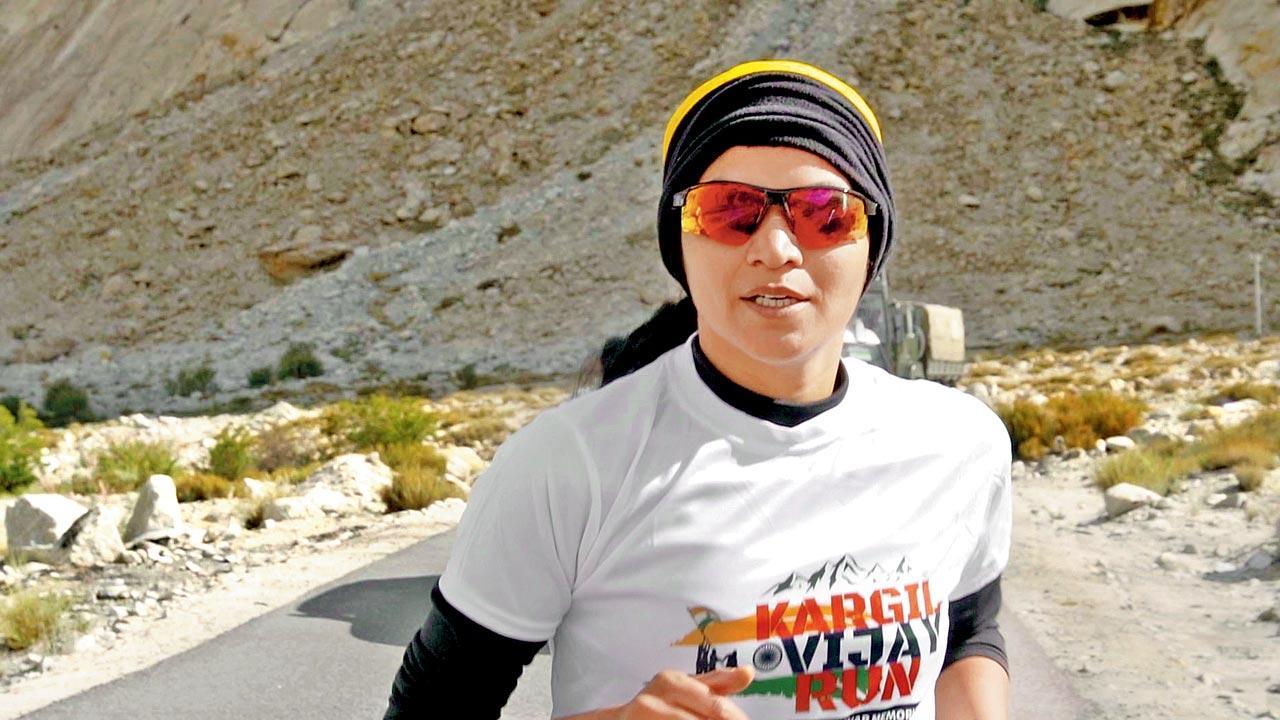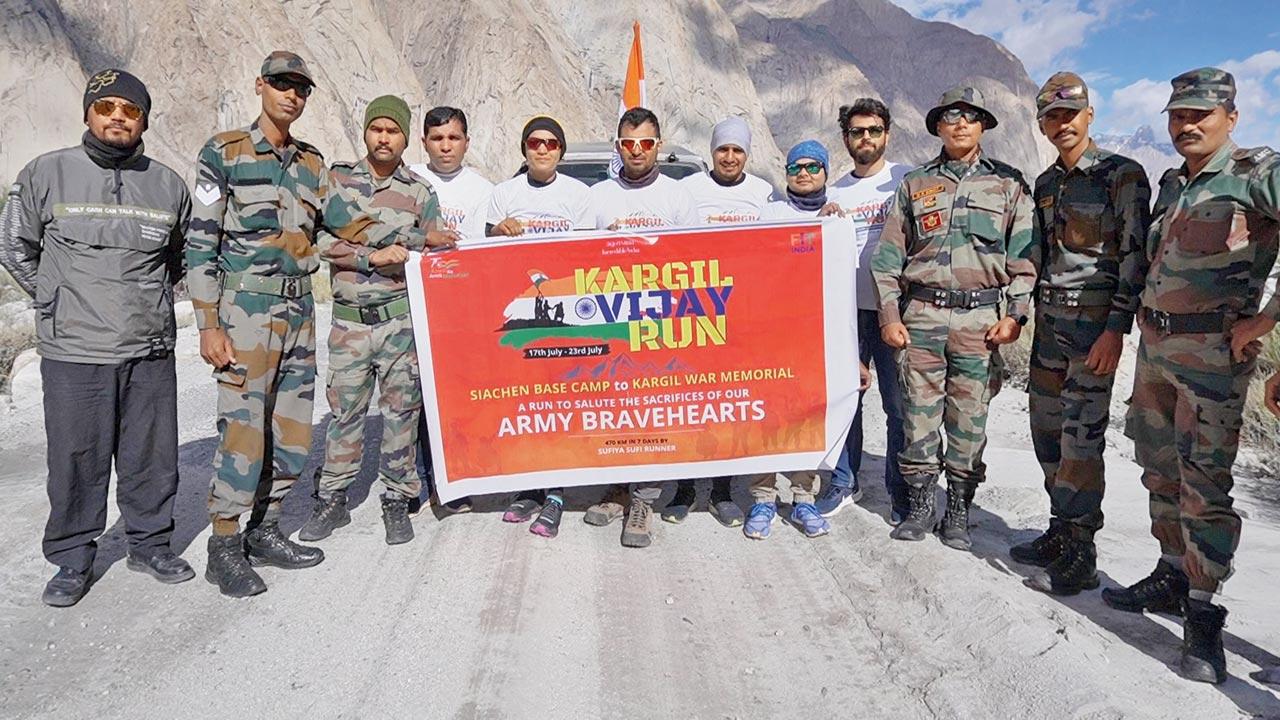An inspiring documentary on an athlete’s tribute run from Siachen to Kargil, for India’s soldiers, presents the human side of a champion

Producer Roopa Barua says Sufiya is like a blank canvas while she is in motion
![]() Slaying all my demons/ I am blazing through the seasons/ I am all that I believe in/ And the road keeps on calling...
Slaying all my demons/ I am blazing through the seasons/ I am all that I believe in/ And the road keeps on calling...
ADVERTISEMENT
These lyrics—set to a hip-hop melody driven by drum loops and guitar tunes—instantly attracted my attention to the 39-minute documentary Ladakh 470 which captures Sufiya Sufi Runner’s tribute run from Siachen to Kargil in record time—seven days. The film, directed by Shivam Singh Rajput and produced by Roopa Barua, has found its way into the top recommendation lists. It will be screened at the 2024 Kala Ghoda Arts Festival in January, and Sufiya herself will run as the ambassador of the fest’s marathon.
Sufiya’s spirit, her sense of being, her determination to cover an uneven, mountainous terrain as a tribute to slain Indian soldiers is captured in the track Higher, I Am Going Higher, composed by acclaimed singer-musician Joi Barua, and assisted by Pronoy Kumar Saikia.
I was touched by Joi’s deep understanding of Sufiya’s psyche as an athlete. “Sufiya began running later in her life... Previously, she worked in a different professional set up. For me, it was like she suddenly found a sense of direction or purpose to her existence. When I first heard her story, disruptive rap or rebel music played in my mind,” he says.
 The athlete poses with soldiers during the Kargil Vijay Run
The athlete poses with soldiers during the Kargil Vijay Run
Sufiya’s newfound meaning to life is encapsulated in Joi’s thought-through composition: “i’ve been down, i’ve been up/ i’ve been found and i’ve been stuck i just seek, i don’t know like the river needs to flow”. The composer met the athlete only a couple of times during the post-production phase of Ladakh 470. While she was based in Delhi, the composer operated from a studio in Bandra; their connection traversed geographical boundaries.
Given that I hadn’t followed Sufiya’s trajectory as a runner before watching the documentary, it was also rewarding to see a musician’s recognition of a sportsperson. “I met Sufiya last year on Kargil Vijay Diwas, when I had performed on the occasion. After that, we spoke on the phone once. I knew her story. I didn’t aim to have too many conversations; I wanted to retain my perspective on her life by keeping intrusions at bay. That was important for me to create the music for the documentary. I like to create a myth of what a person can achieve. As I put it in my song, “Nothin’s gonna stop me/ My destiny’s my poetry,” Joi says.
Sufiya’s achievements have had a personal impact on the composer. “She inspires me. Her tryst with pain will forever be the stuff of legends,” he says. Sufiya has also left an impression on the film’s director Shivam Singh Rajput, who says the film transformed him. The 21-year-old engineer, a debutante documentary filmmaker, began going to the gym after being witness to Sufiya’s tribute run.
Rajput and the film’s unit, which drove the Siachen-Kargil distance, watched the runner succeed in the most trying situations—gasping for oxygen, lying on the road to regain momentum, crying after achieving a milestone. He recalls many occasions when Sufiya carried on despite being breathless. There was a time in the army transit camp when Rajput felt he couldn’t even come out of his bed. But as he woke up, he realised that Sufiya had already begun climbing Khardung La pass. A wave of raw energy ran through his body, and the crew hit the road. At another point, when she refused to rest, the army support team provided her with supplemental oxygen while she continued walking. It was when she walked with the suspended oxygen pack that Rajput got his best shot of the film.
On the fourth day of the run, Rajput was privy to the boost provided by Sufiya’s coach Rajendra Yadav, and her partner Vikas Saroha, a record-holding cyclist, who devised innovative strategies for the road. During those moments when Saroha saw Sufiya’s spirits dipping, he entertained her by singing cheesy Bollywood songs from inside the accompanying car. Everyone had a good laugh, as Rajput and the others also joined in on the banter. “Such moments were beyond my expectation. Prior to the run, I had no idea that people like her existed, or that I would learn so much at death-defying junctures and extreme climate.”
Sufiya’s significance in the lives of Ladakh 470’s makers is especially evident in her equation with creative producer Roopa Barua. Roopa, an author and award-winning filmmaker, has contributed to the documentary’s direction, too, and given it a new dimension by highlighting the meditative quality of the run. Sufiya is presented not just as the celebrity champion— the winner of four Guinness World Records; the fastest female runner in the world to cover the 6002 km-long Indian Golden Quadrilateral road—but rather as an approachable 38-year-old athlete who started running as late as 2017, in a Delhi half-marathon. Ladakh 470 deeply invests in the human rather than the champion; not the star performer, but the person who believes in testing the limits of human endurance; not an elite icon, but a middle-class, humble Indian who spreads the message of love and peace by running.
Her string of expeditions, especially the Himalayan Ultra Run, form the backdrop of the film—and she has many exciting ones lined up for the next three years. In December 2023, she will participate in a 24-hour stadium run to qualify for the Indian Ultra Running Team. In February next year, she will run in Qatar to reclaim India’s world record title. In July 2024, she will run from the Karakoram Pass to the Kargil War Memorial via Daulat Beg Oldi and the Galwan Valley, to celebrate 25 years of Kargil Vijay Diwas.
Her most ambitious challenge is set for 2025, when she will undertake The Run Around the World—an incredible endeavour covering 30,000 km in 680 days. She aims to be the first female runner in the world to achieve this remarkable feat.
Sufiya calls herself ‘Sufi Runner’. “While running, I enter a zone where I feel a divine power that pushes me to continue despite the pain. This power makes me realise that physical aches and pains are temporary. I consider my tribute run as a one-off; the soldiers guarding our country negotiate the altitudes and fluctuating temperatures on a daily basis,” says Sufiya.
As per Roopa Barua, the film underlines Sufiya’s zen energy, as the runner’s respect for the bravehearts shows not in her words, but her attitude. “Sufiya ran an average of eight to 15 hours daily; she had to opt for off-roading too, so as to lower the distance. But that meant she had to walk, which took away her natural ability to run, sprint and cover distances. This aspect made me think of her process,” Roopa explains. The producer admires Sufiya’s ability to be like a blank canvas while she is in motion. “The runner identifies herself with the single-minded motion of running, like a focused soldier taking on a military operation.” Sufiya didn’t listen to music while she ran, as any distraction would have prevented her from being in the moment.
Sufiya sees running as a way to reach out to people. Raised by her mother Shahnaz Khan, after the untimely loss of her father Rafique Ahmed, a teacher at a government school, Sufiya grew up in and remained bound to Ajmer up to her graduation, along with her three siblings. She left the city for Delhi in 2008 to pursue a course in ground handling in the aviation sector. She worked with a range of airline companies for ten years. It was a three km run in her housing society park in the summer of 2017 that changed her life forever. She ran her first half marathon in November 2017, and her first 52 km ultra-marathon in 2018. Only a week later, she ran her first 67 km ultra-marathon!
At this point, Sufiya and the makers of the documentary are content with the acclaim won by Ladakh 470. Sufiya has another mission in mind: She wishes to visit the homes of the Kargil war heroes with Roopa Barua. Her run was to honour the slain soldiers, the tribute is made complete by meeting their loved ones.
Sumedha Raikar-Mhatre is a culture columnist in search of the sub-text. You can reach her at [email protected]
 Subscribe today by clicking the link and stay updated with the latest news!" Click here!
Subscribe today by clicking the link and stay updated with the latest news!" Click here!







